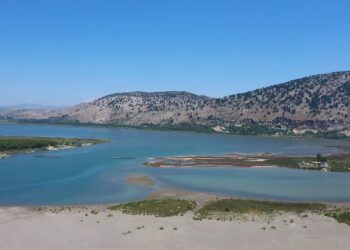By Boldnews.al
Large companies such as Weibo Group, Terna, Geox, Johnson Control, Lear Corporation, Benetton, Ferrero Rocher, Power China, China State Construction Enginering etc., have tried to expand their production lines in Albania over the next five years the latter, but the unfavorable investment climate, high taxes, or lack of qualified human resources has forced them to expand into the region. How failed the Turkish-Chinese giant’s project to re-invest Berat’s textile combo with 600m euros in investment, which is now developing in Macedonia and is seeking to expand into Serbia. Exim Bank’s Chinese bring Albania into the blacklist for investments.
The textile fabric in Berat would have been revamped for two years, employing 6500 employees with at least 600 million euros in investment, as if the Albanian government had been accountable for implementing the project of the Turkish-Chinese giant of clothing production in world, Weibo Group.
The company that produces quality clothing for well-known brands Massimo Dutti, Cortefiel, Barutti, Roy Robson, Brax, Hirmer, Peek & Cloppenburg, Saks 5th Avenue, Dockers and many well-known brands in Turkey with factories in China and Cambodia diversification for opening a new production line in Europe for Europe.
Weibo was unable to open the factory in Turkey because the country has completed the export quotas for Made in Turkey textile in Europe. After Turkey, Albania was attracted to other European countries. In Istanbul, the Albanian community is the biggest, the company’s ties with Albania were great, so the first plans for expansion in Europe were initially for Albania. Between 2013 and 2014, representatives of Weibo Group surveyed for more than eight months the Albanian market.
The consulting companies recommended reactivating the textile combination in Berat. In this area, the textile industry has a nearly 50-year tradition inherited from the communist regime. Berat is among the few cities in Albania that has a skilled workforce that they use from tornadoes to sewing. Moreover, Berat has continued to be a tradition, as many other clothing and shoe manufacturing factories are active in this city, influencing the creation of new experienced workforce. Consequently, Berat could meet Weibo Group’s requirements with “know how” and with buildings. By putting into operation, Weibo intended to realize about 800 million euros of exports per year. But the project has failed with “success” as well as many other major and serious projects being offered to Albania.
This was the case for Albania to set a new standard in the fasone industry by implementing the closed cycle of production and giving real opportunity for the development of the cluster in this industry. The reasons for the failure are some, but the experts who consulted the company claim that the foremost was the irrefutable project.
The tax burden and all other costs were higher than the costs with all the transport from Macedonia to Durres. Today, the Turkish-Chinese giant has opened the factory in Macedonia. For many months, Macedonia’s Prime Minister Nikola Gruevski has personally pledged that he has welcomed investors and, moreover, has extremely accelerated the investment in Macedonia.
Weibo Group Chairman of the Board, Selcuk Alperen, personally announced the selection of Macedonia for the new projects. Alperen, in an official statement, has claimed that the company has built an integrated industrial zone in Kriva Palanka, a free trade zone in Macedonia. The initial investment was 400 million euros with 500 employees, with a project for further expansion depending on production performance. The company, 50% of its production in Macedonia has orders for Hugo Boss, while the rest for big names of European clothing brands. Weibo’s production is vertically aligned from start to finish. The company cares for cotton production and carries out all the processes. But it seems that Macedonia (Kriva Palanka) has not fully met the demand for the workforce, so Weibo is looking for a transfer of part of the activity even in Serbia.
Although Macedonia does not have its priorities in developing the Fason industry, foreign companies with interest to transfer production to the Balkans see it as attractive. Low taxes, the operation of free trade zones (without tax in the first seven years) and the monetary subsidy of any open labor market has made the country a competitive neighbor worthy of industrial and textile waste.
Albania has not only lost its fiscal competitiveness in property rights, but above all lacks development priorities and good will to bring serious investors, experts from Weibo advised on Albania earlier. But they explained that Weibo is not the only lost chance. There are dozens of failed cases only from Turkey.
One of the largest tourist groups in Europe with resumes from Antalya, Belekeu, London and Nisa has offered Albania an investment of 600m euros for the development of a tourist resort. The expert said it was not in the company’s interest to invest in a seductive and beautiful area like the South of the country. The Turks were determined to invest in each piece of land the Albanian government wanted. The resort would be five-star luxury and accommodating over 5000-6000 people. At least 900 people would be hired and the company had plans to develop the part of education for tourism service just as it does in Turkey.
After several meetings with the Albanian authorities, the company has given up. Keeping the name of the Turkish company confidential, the expert said that now, the project that was planned for Albania is being implemented in Romania. A European Union country, Romania has simplified many procedures for foreign investors. Suffice it to have the interest to invest there and the government reimburses from the airline tickets, the hotel costs of any investor showing interest.
Another company, Limak, has shown interest in investing in the tourism sector in Albania, bringing its specialists to study the feasibility of investing. The company then retired after the group was involved in the investment at Istanbul Airport.
But as the Balkan countries have been in a feverish race in facilitating procedures and fees for foreign investors, Albania has taken steps backwards. Currently, our country has the highest tax burden in the region and the worst business climate (Doing Business, 2016 World Bank).
As a result of this situation, the Albanian government has not brought in any foreign investor in the country in the last three years, while affirming that it will orient the model of economic development from consumption to production.
Exim Bank’s Chinese bring Albania into the blacklist
Chinese companies have always been active and persistent in investing in Albania, but lately their interest has culminated with Skavica HEC and Arbr Road. The Albanian government has been in long negotiations with Exim Bank (the bank representing state policies on investments outside China) for the construction of Arbr Street.
Geri Selenica, director of the Albanian Center for Strategic Studies, said that “after Exim Bank analysts’ estimates, Arbr Street project was a bad, even corrupt project. Precisely from this project and from the lack of evaluation of serious proposals, this Bank has placed Albania on the black list and for a four-year period will not evaluate any financing project for Albania. ”
This decision was communicated two weeks ago to a Chinese company that had applied for loans for financing the Adriatic-Ionian highway, Selenica said.
He said that in recent years, large Chinese corporations have had an interest in investing only in the energy sector, mainly in hydropower and less in oil and gas extraction, but no project has been finalized so far.
Power China has offered financing, design and construction on behalf of KESH of HEC Skavica (big) 485 meters in October 2014. The investment amounted to 1 billion euros out of which 600 million for dam construction and over 500 million euros for expropriation and environmental and economic rehabilitation of the flooded area.
Skavica’s way of financing was a soft credit to KESH over 1 billion euros, which could be repaid by 15 installments for 15 years after the end of the work. Meanwhile, according to Chinese estimates, the 485 meter Skavica would pay off the investment for 12 years, as it would have a production capacity of 2 million GW per year worth 100 million euros and very strategic for the Albanian economy. The government never replied to the Chinese. In the hydrocarbon sector, CEFC (China Energy Fund) and CNPC (China National Petroleum Corp) have expressed interest. The Chinese company that signed the Bankers Petroleum interest-buying agreement with double the stock exchange value is listed on the stock exchange. Many stock exchanges cast doubt on the true purpose of this contract, said Chinese investment consultant in Albania.
He showed that in the road construction sector there was interest from several Chinese firms such as Sinohydro, China Pacific Construction and CRBC. Sinohydro is building two highways in Macedonia, while CRBC is a highway in Montenegro and will build Rijeka-Zagrep-Bozovo (Hungary) fast track.
No Chinese firm has been successful for the roads in Albania, as there is no serious road project and Albania has no funding opportunities for such projects, the expert said.
Albania’s blacklisting from Exim Bank automatically blocks any interest from Chinese firms for road and motorway construction, Selenica announced.
Leave Albania for Serbia
Earlier, “Monitor” has highlighted dozens of European and intercontinental companies that are offered to invest in Albania, but the climate that our country offers has not oriented projects towards feasibility, and companies have expanded in the region.
When the famous Italian shoe production company Geox decided in 2013 to move the production line from Morocco to the Balkans, Albania was in focus because of its geographical position and the cheap labor cost.
Three years ago they studied the Albanian market, Mrs. Donika Mici, head of the Donniana shoe factory, retired from the cheap labor force and her qualification, but a tempting offer from Serbia, has changed all plans. In exchange for employing 1250 employees, the government of Serbia has subsidized Geox with 11.2 million euros (9 thousand euros for a job, according to foreign media), covering nearly half of the investment value of 23 million euros.
Serbia has been very competitive in recent years in attracting foreign investment, especially from Italy. Benetton, Ferrero Rocher, Geox are some cases where Italian investors, having studied both markets, have chosen Serbia to invest.
Currently, Serbia is the most aggressive in the region for facilitating investors. Two are the strongest points. Tax exemption for the first three years of activity and subsidy with 1500 euros for each employee. Also, the land for investment is provided free of charge. Serbia also offers another advantage as there are many bilateral trade agreements for customs-free trade, especially with the former Soviet republics, pushing some entities targeting the former Soviet Union’s markets to open businesses in Serbia with a view to avoiding tax doubles, who have to pay in Albania
The vehicle support industry goes to Macedonia
At least three major car manufacturing companies, CapCon, Johnson Control and Lear have been studying the Albanian market for the last three years to open their production lines in search of cheaper labor costs. But, as the sources told the companies, among several reasons, they have chosen not to invest in Albania, due to the lack of skilled workers. Now, all three companies have opened up activities in Macedonia, employing thousands of people. Johnson Control announced the opening of a second factory, following the success of that in Stip, while it was in 2014 the largest entrepreneur in that country from the annual turnover.
The other US company manufacturing airbegs for cars, CapCon, having failed in Albania to find a skilled labor force, chose Macedonia. Since 2015, the company has invested 18 million euros and has opened 400 new jobs there.
Interest groups in Albania explained to Monitor that Americans initially showed interest in the Albanian market, driven by faster access and lower transport costs to Europe. But her efforts failed because they could not find the skilled workforce for the production needs they had.
And while the region is increasingly absorbing high-value industries for the economy, Andronaq Londo, Dean of the Faculty of Mechanical Engineering, claims that Albania has lost its human resource competitiveness that is needed to meet the demands of world industry giants. Londo, for this situation, listed a number of causes that disadvantaged us in relation to the region.
The first is the loss of tradition. Albania, before the 1990s, because of its extreme isolation, developed the closed cycle for all lines of economy, unlike its neighbors. After the 1990s, the economy, from production and closed cycle, passed into consumption and the education system oriented the best to social sciences.
Londo claimed that currently, the higher education system, namely mechanical engineering, has limited opportunities due to the lack of infrastructure and laboratories. A good engineer can not suffice only theoretically, Dean said. He asserted that the university tries to go beyond the government’s priorities. In this period it is seen that the economy is orienting towards the production and expansion of the energy market, so students are also advised to graduate in electrical engineering. Londo said that the government should have a clear and multi-year priority so that the university education system responds to the real needs of the market. But the professor asserts that it is very important for the government to orient vocational secondary education as the main link to form the skilled labor force for which the economy at this moment is in great need.
Fail with Albania, the Italians build the interconnection of energy from Montenegro
Italy’s state-of-the-art energy transmission company, TERNA, is advancing in building an underwater cableway for electricity transmission with Montenegro, scheduled to start power transmission in 2017. With its construction, Albania lost eventually the opportunity to transit energy from the Balkans to Italy in the medium term and vice versa, when it is known that the interest of Italian state companies was very large that the underwater cable transmission line started from Albania, starting from the short distance that enabled project at lower cost.
In 2007, the Albanian government signed a memorandum of understanding with Enel’s general manager, Fluvio Conti, on the development of the Albanian energy system.
At the heart of the deal was the construction of a coal-fired power plant in the Durres region, by the Italian energy giant. The investment amounted to $ 1.9 billion and included the construction of a new underwater transmission line for energy to Italy.
But nearly six-year efforts with Albania have not been successful for Italian neighbors have finalized the energy transmission project with Montenegro.
The works are advancing. Investing from TERNA amounts to EUR 760 million, with EUR 100 million being investments in the existing network in Montenegro.
The underwater cable power line will connect Italy to the Balkans through 415 kilometers, with 400 kilovolt capacity from Villanova in Kotor, with a 1,000 megawatt transmission capacity.
“Bubble” of Albanian investment figures
Albania and Serbia appear with the highest level of Foreign Direct Investment in the Balkan region. Of the $ 4.6 billion of investment inflows in the five countries in the region at the end of 2014, a quarter of them or more than $ 1 billion, were allocated to Albania according to UNCTAD (United Nations Program, to address development issues, especially international trade).
But investments in Albania, apparently in great value, have not brought added value and employment. More than half of them are concentrated in the oil extraction industry. Drilling a barrel of oil ranges from $ 1-2 million and in many cases, the amount spent is not justified by production and does not generate employment.
For all of 2015, foreign investment amounted to 871 million euros, increasing by only 7.1 percent in relation to 2014 and being 5.7 percent lower compared to 2013.
The fourth quarter was the most negative, as Bankers Petroleum, the largest investor in the country, almost suspended production due to conflicts with the Albanian government and a sharp fall in oil prices. According to sources from Bankers, in 2015, the company’s investments were about 130m euros, and this year, they are expected to halve, to about 65m euros, as no new wells are foreseen.
According to the Bank of Albania, “inflows in the form of direct investments during this period came mainly from the hydrocarbon sector by about 44%, that of the energy by about 10%, followed by the banking and telecommunications sectors, respectively 10% and 7% of inflows of Foreign Direct Investment “. But according to Monitor’s sources at the hydrocarbon market, it is learned that the high figure of foreign investment is accounted for by the Bankers plan and not the fact, which was much lower than the plan due to lower prices oil.
Albania loses its competitiveness
For two years, Albania has lost regional competitiveness in fiscal policy, ranking as the country with the highest tax burden. In the first estimate from the investor’s point of view, this is a major disadvantage. Then incentives were evaluated. What does Albania offer for investors and what our neighbors. Countries such as Serbia, Macedonia and Bosnia, which are unable to develop tourism, maritime transport and have no income from migration, are very aggressive for incentives to investors as the only means of generating monetary values and employment. Albania did not have to strive for so much because of the geographical position closer to Italy, the prospect for tourism, underground, oil and so on.
Albania, together with Serbia, has the highest tax rates in the region, VAT, insurance contributions paid by the employer and corporation tax. Not surprisingly, both countries have the highest tax rates in percentage terms, respectively 36.5% Albania and 39.7% Serbia.
VAT
According to a table drawn from World Bank data, Albania and Serbia have the highest VAT rate at 20%.
In Macedonia, the highest VAT rate is 18%, while the country has a reduced VAT of 5% for food products, medical products, agricultural machinery, publications, first sale of buildings and apartments, as well as transport and accommodation.
Montenegro has VAT of 19%, Bosnia 17% and Kosovo at the lowest level of 16%.
Corporate tax
While before 2008, the entire region entered into a feverish race, which reduced taxes as much as possible and implemented a flat tax at close to 10%, with the escalation of the economic crisis, it turns out that only Serbia and Albania increased the tax on corporations at 15%. Other states continued to maintain lower tax rates paid by enterprises.
Montenegro currently has the lowest level of tax in the region, to 9%, while Macedonia, Kosovo and Bosnia have it at 10%.
Contributions paid by the employer
Investments, what the region offers
Aggressive Macedonia
The government has adopted laws that foresee the creation of free zones within industrial development areas.
Since 2009, Macedonia has enabled land purchases from investors to be carried out on favorable terms, with a 30% discount. So far, more than 2,500 companies have used the opportunity to buy land. The Constitution of the Republic of Macedonia guarantees the right of property investors.
The textile industry is the second largest in exports to Macedonia. The agribusiness sector employs 435,500 people, with a population of 2.1 million.
Macedonian construction companies can build factories with international standards and at the most competitive prices in Europe. The average cost of construction 170-210 euros per square meter. The sale price of state construction land for industrial and manufacturing facilities varies depending on the location, from 5-40 m². Macedonia has a business support environment. The company is registered for four hours and is ranked first in the World Bank “Doing Business 2016” ranking.
Macedonia is at the crossroads of Southeast Europe, making it an ideal transit for European markets. There are developed road and rail lines, which combined enable the country access to any inhabited place in Macedonia in less than 3 hours.
Railway infrastructure has been since 1870. Macedonia’s rail network system is connected north-south with the rail network systems of Serbia and Greece. The average monthly gross salary in 2013 is 502 euros. The government has decided to increase the amount of subsidies for attracting tourists from Bosnia, Serbia, Bulgaria and from 25 to 35 euros per tourist. In recent years, the software industry has emerged as one of the most dynamic sectors of the Macedonian economy. With a 7.7% increase in 2009, Macedonia’s software industry passed the pace of overall economic development and became a motor for growth, innovation and competitiveness. The information technology market in Macedonia has increased significantly in 2009 by 7.7%, reaching 212 million USD in 2014.
The state offers state aid to investors in industrial areas up to 500,000 euros. Macedonia provides long-term rental facilities for up to 99 years. Low taxes, flat corporate rates and personal income tax at 10%; 0% tax on undistributed profits are an advantage. It’s a low-cost operating site. There is a geostrategic position. Goods are delivered within one day in Eastern Europe, maximum two days in Central and Western Europe. It is developed Telephony and Wireless services. Universities are willing to cooperate with future investors in meeting the required skills.
Local people speak widely English and regional languages have extensive use. There are skilled workforce (42% under the age of 30) with a strong work ethic, especially in the industrial sector.
Albania competes with low wages
Albania has a dynamic export sector. Exports have risen from $ 1 billion to $ 2.5 billion this year. 57% of Albania’s population is under 35 years of age. The average salary in Albania is one of the most competitive in the region. The minimum wage is the lowest in the region. Albania has over 1 million well-educated, highly motivated professionals who speak English, Italian and Greek widely. Every year, more than 100,000 students enroll in university. Albania has many opportunities for public-private investment. It also has a range of opportunities in the emerging and growing sectors such as: energy, agriculture, mechanical industry and tourism, according to Albania’s introductory report by the Albanian Investment Development Agency (AIDA).
Serbia, competitive with energy costs
Investors are excluded 10 years from profit tax. Companies employ over 100 people and invest more than 8.5 million euros.
According to EUROSTAT, Serbia has the lowest cost of electricity, gas, other fuels and fixed telephony among 37 European countries. Serbia has high-quality manpower.
The existence of educated and skilled workforce are incentives for investors. Free trade agreements with the Russian Federation and Turkey, as well as developed infrastructure and favorable geographic position are the main factors for investment in Serbia.
Montenegro, the most favorable taxes in Europe
Since the introduction of the German brand in November 1999 and later the euro in February 2002, the country has succeeded in creating a favorable business climate and attracting reputable foreign investors.
The country has established the Development Investment Fund. There is one of the most competitive tax systems in Europe and the country continues to show improvement in the business environment through structural reforms combined with reforms in public administration, education and health. In line with structural reforms, new investments in infrastructure, energy and tourism have led the economy forward.















